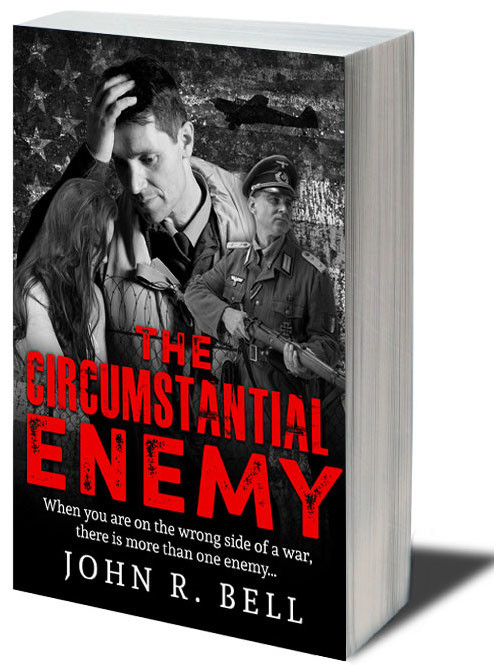Two days ago I published an interview with John Bell, former CEO of Nabob (acquired by Kraft) and recently published novelist, about his radical career change. During that interview I asked John if he would be willing to write a guest post for current leaders about what he had learned from writing a novel that he wished he’d known as a CEO. I am delighted to host his guest post today, as John shares some excellent advice for leaders at all levels.
 Guest Post by John R. Bell
Guest Post by John R. Bell
I’ve written over a 100 blogs about leadership, strategy and culture. Within that portfolio are several accounts of business reinvention and transformation. Yet it was only a few months ago that I composed my first post on another type of reinvention – personal reinvention. My own.
You see, after I departed the corner office I had this crazy idea to write a thrilling historical novel. The means to that end was a lonely trek up a perilous mountain, its peak masked by high clouds. Along the way I faced several hazards and setbacks, and had I not summoned the traits that helped me succeed as a CEO, The Circumstantial Enemy would never have come to fruition. For eight years inspiration, passion, discipline, determination, and vison edged me upward to the summit of publishing’s Promised Land.
I shared this story with best-selling author and consultant, Jesse Stoner, a woman who knows more than a thing or two about the power of enduring vision. Sure, Jesse was eager to hear how I became a published novelist, but there was something else on her mind; she asked if I’d considered this reinvention from the opposite direction. What had I learned from writing a novel that I wished I’d known as a CEO? Five things came to mind.
I Learned the Importance of Understanding my Audience
Every genre of fiction must fulfill the expectations of a unique audience. Imagine the difference between readers of erotic fiction and those of comedic fiction. If authors fail to understand and appreciate their readers, their books will disappoint. Likewise, if CEOs misjudge their shareholders and their customers, they too will disappoint. With regard to shareholders, I could have done better. But I continue to believe I was right to make the company’s employees priority-one. Unhappy employees lead to unhappy customers and unhappy shareholders.
I Learned What My Characters Wanted
Fiction is about the characters and their motivations. Romeo and Juliet wanted each other. In The Circumstantial Enemy, Tony Babic wanted freedom from repression. Once I fully comprehended my characters’ thoughts and feelings, writing what they would do or not do became easier. Like a novel’s characters, employees are equally complex and interesting people with unique wants and needs. Like most CEOs, I was pulled in many directions. Devoting more time to better understand the company’s most valued asset would have delivered better results.
I Learned to Take a Breather at the Crossroads of Indecision
Twice I faced writer’s block. And twice, I put the work aside and didn’t return to my manuscript until I found a solution. The second ‘block’ was the most distressing. Nearing the novel’s finale, I realized that my ending was weak. I let it be for a couple of weeks and a better ending emerged. As a CEO, I thrived on quick decision-making. When your competitors have deeper pockets than you, you have to be nimble, prepared to take risks, eager to make early calls with 80% of the information rather than wait months for 100% of the facts. I’m thinking that the odd breather may have brought refreshing insights.
I Learned to Trust My Readers
This advice came from my editor. She said I have a habit of wrapping up scenes in nice packages. In fiction, everything DOES NOT need to be explained. Readers are intelligent. They enjoy the challenge of discovery. So do employees. CEOs can’t do it all themselves. I admit to being an overly “hands on” leader. I should have given more rope. There’s no doubt; the characters in the business I led were up to it.
I Learned to Regard Yesterday’s Prose as a Small Victory
Every morning before I struck a key, I re-read the previous day’s prose. Of course I made changes, but simultaneously I took pride in the fact that I’d made progress in taking the plot further. In business, there is always a list of big projects. Rightly or wrongly, achieving the annual budget usually rises to the top. CEOs who discipline themselves to celebrate small wins facilitate a culture of winning. Small wins lead to bigger wins.
 Before becoming an author, John Bell was a CEO, global strategy consultant, and a director of several organizations. A prolific blogger, John’s musings on strategy, leadership, and branding have appeared in various journals such as Fortune, Forbes and ceoafterlife.com.
Before becoming an author, John Bell was a CEO, global strategy consultant, and a director of several organizations. A prolific blogger, John’s musings on strategy, leadership, and branding have appeared in various journals such as Fortune, Forbes and ceoafterlife.com.
John’s engaging novel, The Circumstantial Enemy chronicles Tony Babic, a young pilot who finds himself forcibly aligned with Hitler’s Luftwaffe in 1941. Unbeknownst to Tony, his sweetheart Katarina and best friend Goran have taken the side of the opposing communist partisans. The threesome soon discover that love and friendship can not circumvent the ideals of this war. An energetic journey to freedom through minefields of hatred, betrayal, and revenge, this is a story about the strength of the human spirit, and the power of friendship, love, and forgiveness. Available at Amazon.













John, Congratulations on the book…I look forward to reading it!
I am thankful Jesse creatively turned the question around on you. What a valuable post filled with wisdom for all of us! I could write my own post about what I love about the reflections you offer here on Jesse’s blog. I was particularly struck by what I perceive is a strong theme of “trust” in yourself and your colleagues. And kudos for placing employees first. I’ve never known an engaged, motivated employee to disappoint a customer! Again, congratulations on the book and thanks for sharing your insights!
Thanks so much for the kind words, Art. Yes, Jesse did turn the tables on me. Quite frankly, I had to give her challenge plenty of thought. It’s not like I wasn’t practicing what I learned as a novice when I was a CEO – it’s that I could have done more and trusted more. Hopefully, today’s generation of leaders can learn from this experience. 25 years after the c-suite, I no longer think about earnings and market share. I think about the people. Thanks for raising the powerful issue of trust, Art
It’s a great perspective and your transparency is the hallmark of a thoughtful leader! I am always fascinated by the fact that events and experiences can come when we step back and see them as metaphors for learning. Alas, few people do. Congratulations on your new career!
Now I look forward to reading your novel.
Thank you for adding your insight, Eileen. It’s a shame those of us caught in the heat of battle in our younger days of leadership failed to step back and see the metaphors for learning. Glad we have folks like you (and grey-hairs like me) to raise the awareness of this opportunity for better leadership and a better life.
I have a feeling you are cutting yourself short when you recall your leadership journey. You didn’t just develop insight when writing a novel… you just didn’t have the words to wrap around your practice.
Indeed, John is being humble, as he was an incredibly effective and highly respected CEO. He turned around a business that was nearly bankrupt and made it one of the leading coffee companies in the country. And even as he was forced to make hard decisions, he earned the respect and trust of his employees. His book Do Less Better chronicles how he did this.
Thanks for mentioning ‘Do Less Better’, Jesse. This book, published in 2015, remains relative today. Shareholders and c-suites still mistakenly think that doing more and more with less and less is the path to success. Focus and strategic sacrifice is the enduring answer but so few leaders have the courage to practice that modus operandi. Lego and In-N-Burger are great examples of Doing Less Better. The result is superior performance from strategic advantage.
Jesse is like Barbara Walters. She brings out the best in people. I enjoyed your insights immensely and it prompts a question. You have authored books previously. Was the challenge on this book different from the previous books?
For me, Stan, writing non-fiction came easy. In a little over a year, “Do Less Better’ was written, edited, sold to Palgrave Macmillan and published. Historical Fiction-writing was far more challenging. 5 (of many) reasons why:
1. One must research the past meticulously because the historical facts must be 100% correct.
2. Each of the major characters (8-10 of them) must be fully developed. The novelist must know them like members of his/her family.
3. Good fiction is about showing, not telling. The reader must know the character by what they do, not what the author tells you about them.
4. Each character must speak in a dialogue unique to them. For example. the educated might say, “I fail to comprehend your diatribe,” while the uneducated might put it this way, “I ain’t gotta clue what you’re talking ’bout.”
5. You invent the story, the characters, the pacing, and the subtleties.
Bottom line, fiction was tougher but a lot more fun. Thanks for asking, Stan.
John, by the way The Circumstantial Enemy is on my book list. I really enjoyed your insights!
Its a great story. Well-written and keeps your interest. Plus I learned about an aspect of WWII I knew nothing about. Definitely recommend reading it, Stan.
Love to get your take on the book, Stan.
After our sharing, John, I anticipate reading it!
Always Be Learning! Thanks Jesse.